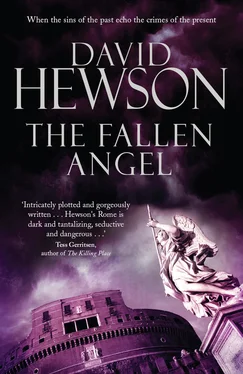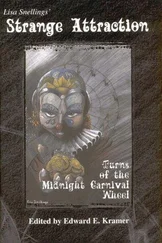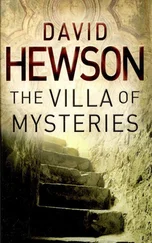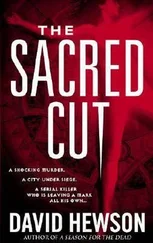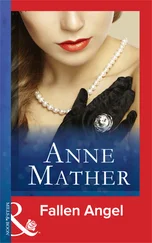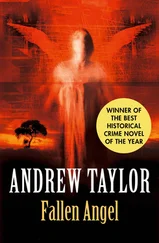David Hewson - The Fallen Angel
Здесь есть возможность читать онлайн «David Hewson - The Fallen Angel» весь текст электронной книги совершенно бесплатно (целиком полную версию без сокращений). В некоторых случаях можно слушать аудио, скачать через торрент в формате fb2 и присутствует краткое содержание. Жанр: Триллер, на английском языке. Описание произведения, (предисловие) а так же отзывы посетителей доступны на портале библиотеки ЛибКат.
- Название:The Fallen Angel
- Автор:
- Жанр:
- Год:неизвестен
- ISBN:нет данных
- Рейтинг книги:5 / 5. Голосов: 1
-
Избранное:Добавить в избранное
- Отзывы:
-
Ваша оценка:
- 100
- 1
- 2
- 3
- 4
- 5
The Fallen Angel: краткое содержание, описание и аннотация
Предлагаем к чтению аннотацию, описание, краткое содержание или предисловие (зависит от того, что написал сам автор книги «The Fallen Angel»). Если вы не нашли необходимую информацию о книге — напишите в комментариях, мы постараемся отыскать её.
The Fallen Angel — читать онлайн бесплатно полную книгу (весь текст) целиком
Ниже представлен текст книги, разбитый по страницам. Система сохранения места последней прочитанной страницы, позволяет с удобством читать онлайн бесплатно книгу «The Fallen Angel», без необходимости каждый раз заново искать на чём Вы остановились. Поставьте закладку, и сможете в любой момент перейти на страницу, на которой закончили чтение.
Интервал:
Закладка:
Costa thrust the flowers out a little more, and realized as he did so how sorry some of them looked.
‘I asked you to call first,’ she said.
‘Busy day.’
‘Busy? Doing what? You’re on holiday, aren’t you?’
There was something in the way she spoke, a tone that was almost accusing. He didn’t understand.
‘All sorts.’
Her attention had gone beyond the flowers to the tatty Vespa on its stand on the cobblestones.
‘That’s your scooter, is it? The one Leo told me about?’
‘That’s her,’ he said proudly. ‘Look. You’re living just up the street from one of the best pizza places in Rome. Da Baffetto. We don’t need the scooter. You have to queue usually but. .’ He pulled out his police ID card. ‘Sometimes I have ways.’
She sighed then turned round. He got the message, tucked the bad bouquet under his arm, then gripped the clasp of the pearl necklace and closed it against the warm dark skin of her neck. It was the first time he’d performed this simple act since his wife had died and the closeness of it, the pointless intimacy, made him feel wistful and a little sad.
A tall, muscular man, bald, intellectual-looking, with fashionably heavy black plastic glasses and a haughty pale face, came into view from behind her.
‘Agata won’t be eating pizza tonight,’ he announced in a clipped Milanese accent.
Costa looked at him, trying to understand. The newcomer was about forty-five, handsome in an arrogant, patrician way. He wore a silvery grey suit, silk perhaps, very expensive, and eyed the little Vespa as if it were poisonous. Still looking at the scooter he pulled out a set of car keys and pushed a button. There was a grey Alfa Romeo saloon parked thoughtlessly along the road. It made a loud beep then the lights flashed and the doors clicked.
‘I’ll drive us to Testaccio,’ he announced, then placed a proprietorial arm around Agata’s shoulder. ‘The table is booked for eight thirty at Checchino’s. We shouldn’t be late.’
‘Checchino’s?’ Costa knew the place, a little. One of Rome’s most pricey restaurants, not that its speciality — offal — was something he’d touch. ‘Nice if you like that kind of thing.’
‘She will,’ the man interjected with a sardonic smile before almost pushing her out of the apartment.
‘Bruno’s my new boss,’ Agata said as she turned and locked the door, embarrassed in a way that made Costa feel deeply guilty. ‘We’ve got to talk about work. I’m sorry. If you’d called. . If I’d guessed you were at a loose end. I never knew. From seeing you today. .’
‘No problem,’ he cut in with a smile, then wondered what she was about to say. ‘You saw me?’
She didn’t answer and the man had got her out of the apartment so quickly there was no chance to ask again.
As Bruno bustled her off she turned and made the gesture of a phone, surreptitiously as if she didn’t want him to notice. Costa clung to the bunch of flowers and nodded, still smiling.
‘Of course,’ he said to himself as she climbed into the shiny Alfa. Its powerful engine roared with rather more noise and vigour than was necessary. Then Bruno drove briskly away along the narrow, congested street.
An elderly woman in a cotton dress, an ancient checked apron and saggy stockings was sweeping up outside the tiny pasta shop next to the florist’s. Costa walked over and said, ‘Signora?’
She looked at him in a knowing way that suggested she’d followed every moment of this little encounter.
‘Some flowers,’ Costa said, offering her the bouquet.
Her lined face brightened.
‘You’re a kind young man. A lady appreciates that. Grazie. ’
‘ Prego. ’
‘One word of advice,’ she added, waving a finger.
His heart fell. Romans, even complete strangers, had a way of telling you frankly what they thought, however unwelcome the message.
‘Yes?’
‘Kindness is all well and good. But remember that saying? All’s fair in love and war?’
‘I never really understood it,’ Costa admitted.
She patted his arm as she took the bouquet and said, ‘It shows.’
He shrugged then went and sat on the Vespa, watching the people come and go down the Via Governo Vecchio. Young and old. Couples and families. Queuing patiently for Baffetto’s cheap and excellent pizzas as they did every night, even in the rain. Ordinary men and women, the kind he liked, the kind he wanted to work for, to protect, wandering around on a lazy late-August evening, seemingly without a care in the world. Very few of them, he noticed, were alone.
It was stupid to turn up like that. Selfish to think she would be waiting there, for him alone. Agata Graziano was a beautiful, intelligent young woman discovering a new life in a city where she’d grown up behind the enclosing walls of a convent. An attachment to a solitary cop fumbling through the years, one so lacking in direction that he thought rebuilding an ancient Vespa was a worthwhile venture for a man turned thirty — this was surely the last thing she needed.
Costa looked at his watch. He’d be home in twenty-five minutes, back behind the walls of the farmhouse where he grew up. Somewhere that wasn’t a part of the city, didn’t belong to its ungainly mass of awkward humanity. The place was a kind of escape. A sanctuary. Somewhere to hide. He didn’t mind that at times.
‘Home,’ he said to himself, and, without thinking, popped the scooter kick-start four times in a row then, to compound matters, absent-mindedly jerked on the throttle.
The two-stroke engine coughed once, sputtered, choked and died.
Flooded. That meant waiting an hour or so. Or taking out the spark plug and fiddling with the carburettor, which involved tools he hadn’t brought along.
The old woman was still watching him, holding the bouquet, shaking her head.
At that moment his phone buzzed; he felt grateful and stared at the screen. He’d given his number to Mina Gabriel in case she needed it. Now she’d sent a message. It read, ‘Do you believe what that horrid man said? Do you think I’m guilty of something?’
He sighed, gave up entirely on the Vespa and phoned her back. From the sound of her voice she’d been crying.
‘Mina? It’s Nic. Are you all right?’
She mumbled a simple, tetchy ‘Yes.’ Then nothing.
‘Listen to me. Don’t read too much into what happened this afternoon. Leo’s a good man. He’s my friend. He wants to help. We all do.’
‘Help?’
He tried to imagine her, alone in the tower Peroni had told him about.
‘Help,’ he repeated. ‘What can I do?’
‘Nothing.’
‘Tell me, Mina!’
‘Can’t.’ He thought he heard a noise, then understood what it was. She was closing a door, perhaps to her bedroom. Trying to make sure she wasn’t heard. Then she whispered, ‘Don’t believe what anyone says about me, Nic. It’s not true.’
‘No one’s saying anything. .’
‘I am not some monster!’
‘I know that.’
‘No, you don’t.’
The petulant tone of a child again. There was another sound. A louder female voice. Her mother, he thought immediately. Shouting. Angry. Words he couldn’t quite understand, though he knew what they meant. Then a shriek of pain accompanied by what sounded like a physical blow, and the line went dead.
Families. He thought of Peroni and his love of everything to do with that word. Of Falcone and how the very mention of such a secret, insular closeness could place a dark cloud in the eyes of one of the most decent men he knew. These tight, sometimes cloying ties encompassed the best of humanity and, on occasion, masked the worst of it.
‘I am not some monster,’ Costa repeated to himself and wondered: who is? Who would ever admit to that fact? The most vicious and brutal criminals he’d met never saw themselves in that light either, not quite. They felt justified in their actions, possessed of some moral compass, and if the rest of the world failed to understand, then so what? Lives were made, not inherited or handed down. Usually.
Читать дальшеИнтервал:
Закладка:
Похожие книги на «The Fallen Angel»
Представляем Вашему вниманию похожие книги на «The Fallen Angel» списком для выбора. Мы отобрали схожую по названию и смыслу литературу в надежде предоставить читателям больше вариантов отыскать новые, интересные, ещё непрочитанные произведения.
Обсуждение, отзывы о книге «The Fallen Angel» и просто собственные мнения читателей. Оставьте ваши комментарии, напишите, что Вы думаете о произведении, его смысле или главных героях. Укажите что конкретно понравилось, а что нет, и почему Вы так считаете.
